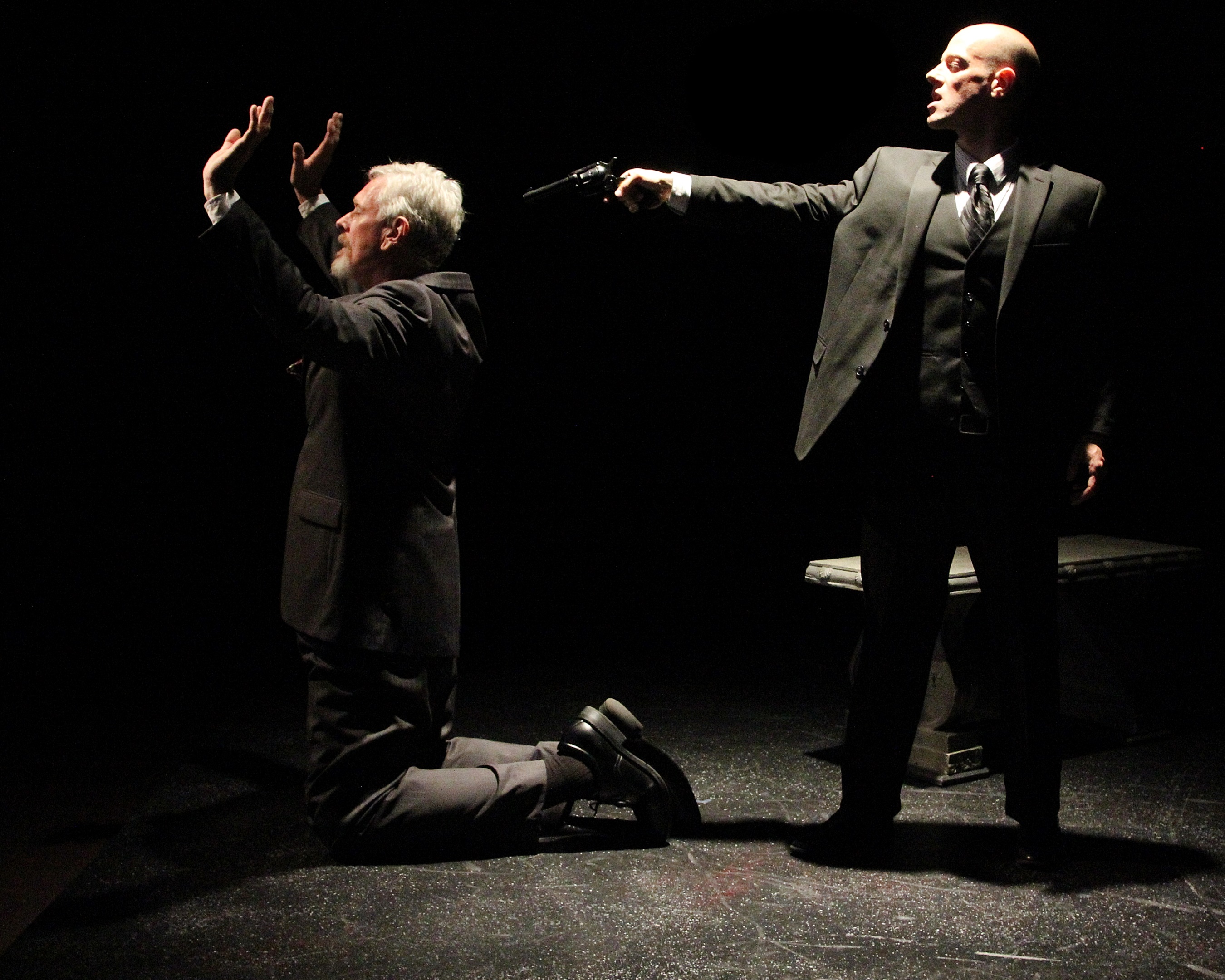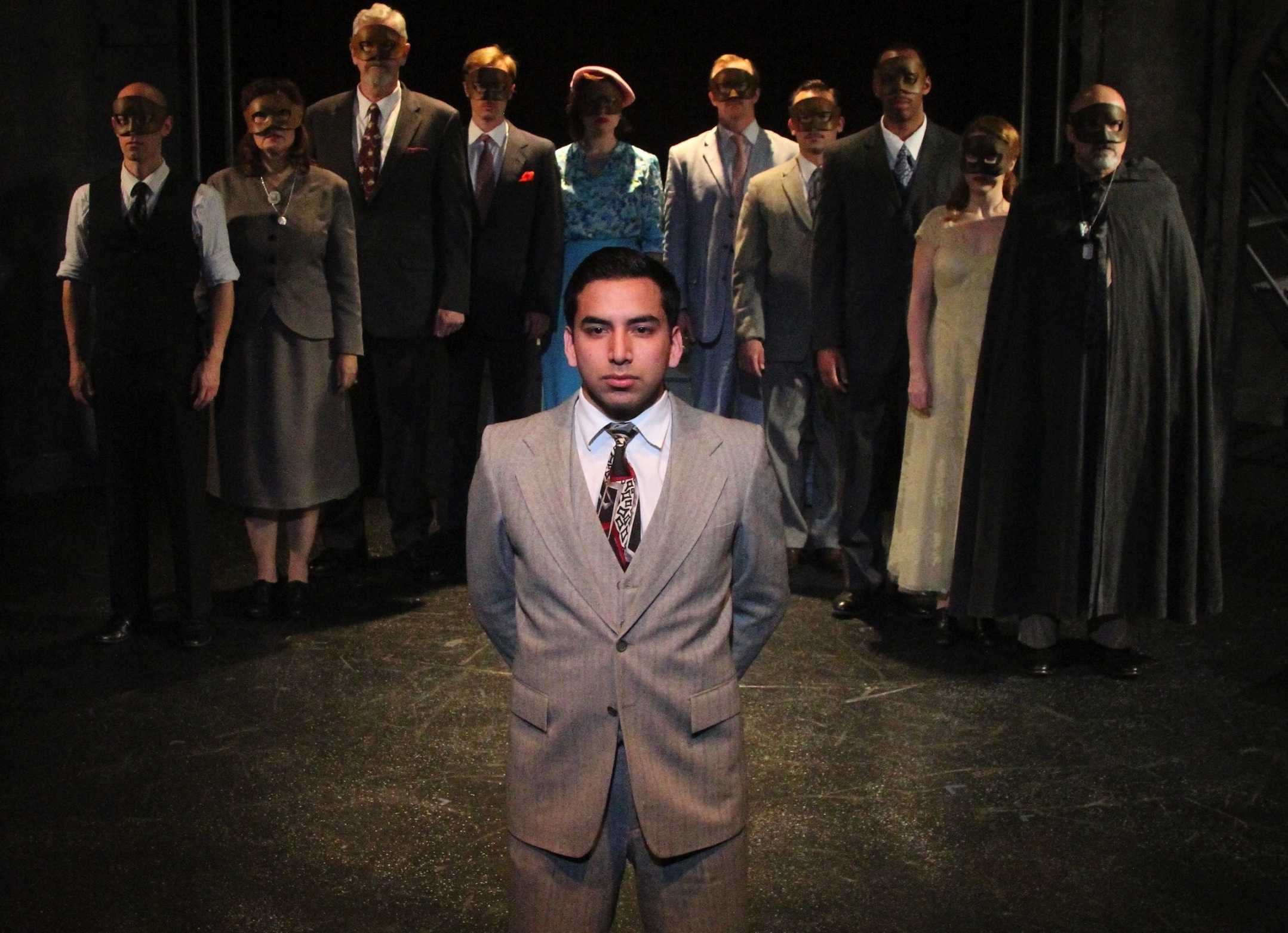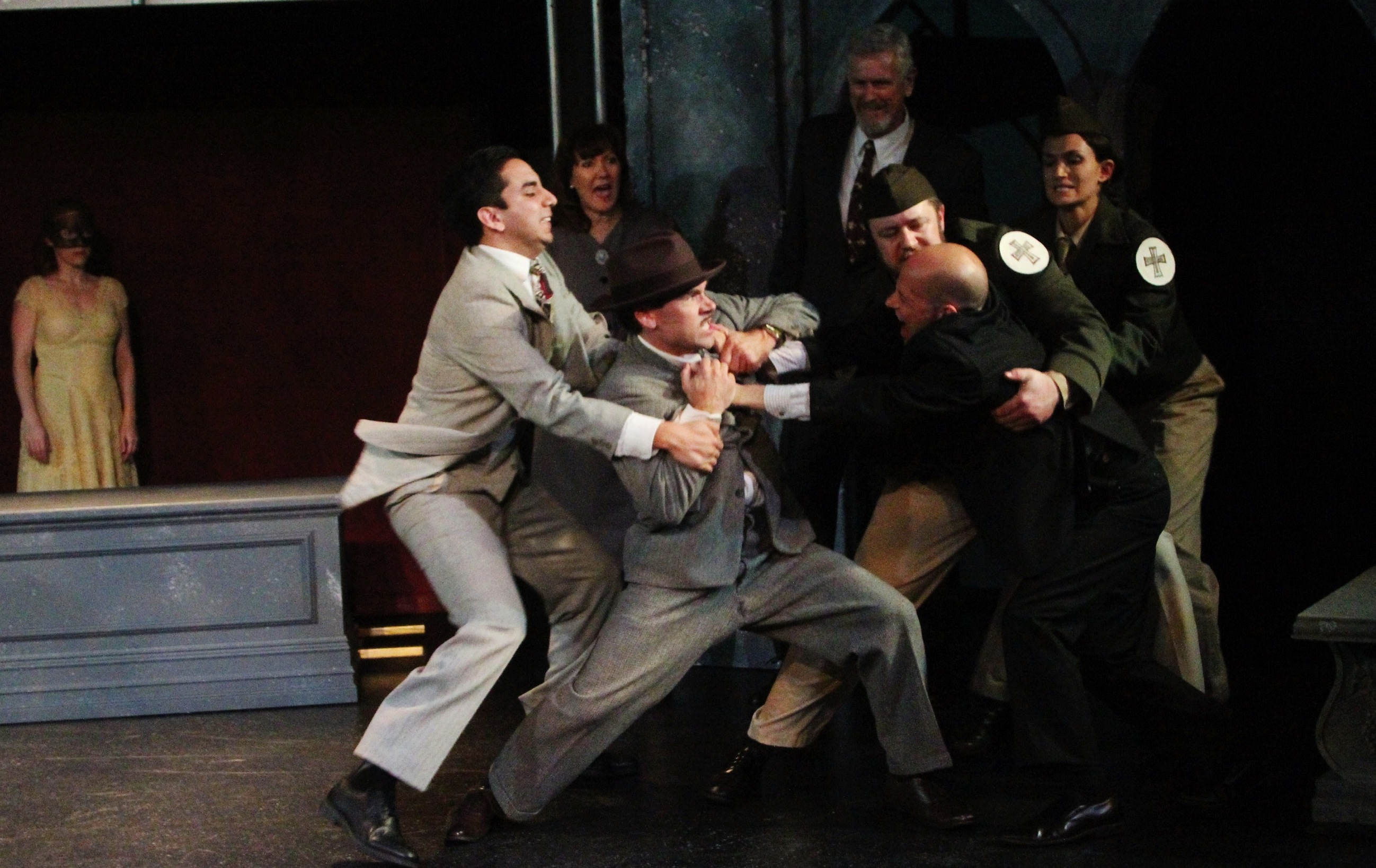

infused his magic directing"
- Broadway World

- Stage Happenings

- Orange Curtain Review






American Coast Theater Company presents
Hamlet
by William Shakespeare
directed by Jeremy Aluma
June – July 2016
at Lyceum Theatre (Costa Mesa, CA)
“Under Jeremy Aluma’s stalwart direction” – Show Mag
“Aluma has deftly infused his magic directing” – Broadway World
“Aluma’s production, confident and competent” – Stage Happenings
“well performed and thoroughly engaging” – Orange Curtain Review
“depth of talent on display” – Colorado Boulevard
Performed in rep with
Rosencrantz and Guildenstern Are Dead
by Tom Stoppard
directed by Christi McHale
Starring…
James McHale as HAMLET
Paul Eggington as KING CLAUDIUS
Susan Berkompas as QUEEN GERTRUDE
Lola Kelly as OPHELIA
Andrew Puente as HORATIO
Ahmed Brooks as POLONIUS
William Crisp as THE GHOST OF KING HAMLET
Jason Evans as LAERTES
Katie Canavan as ROSENCRANTZ
Aaron McGee as GUILDENSTERN
Brock Milhorn as PLAYER KING and MARCELLUS
Amanda Zarr as PLAYER QUEEN, BARNARDO, and GRAVEDIGGER 2
Taylor Stephenson as OSRIC, 4TH PLAYER, and GRAVEDIGGER 1
Ian Jenkins as LUCIANUS and AMBASSADOR
Produced by American Coast Theater Company
Stage Manager: Samantha Fokos
Dramaturge: Amanda A. Padró
Lighting Designer: Zach Simons
Scenic Designer: Paul Eggington
Sound Designer: Garrett Spady
Costume Designer: Lia Hansen and Grace Johnston
Propsmaster: Alexis Stary
Theater Manager: Nick Lazaris
Artistic Producing Director: Susan Berkompas
Associate Artistic Producing Directors: James McHale and Christi McHale
On the 400th anniversary of Shakespeare’s death, American Coast Theater is proud to commemorate the great bard by presenting two unique plays in repertory that explore life and death, fate versus choice, decision and indecision, art versus reality. In Hamlet, the titular character wrestles with whether or not to kill, as the play dramatically asks the question: how much is a life worth? Rosencrantz And Guildenstern Are Dead comedically portrays the misadventures of the two supporting characters from Hamlet, musing their way through events they may or may not have control over as they face their own fate. See both plays for one truly unique, theatrical experience.
Four Clowns’ founder and former artistic director Jeremy Aluma has deftly infused his Four Clowns magic directing his contemporary version of the classic HAMLET just finishing its run at the Lyceum Theater. Eschewing Shakespeare’s couplets and metrics, this normal-speakHAMLET on vengeance, loyalties (both well-earned and misguided) and betrayals could be in any time period where fedora-ed men wear three-piece suits and ties while women can wear baggy pastel-colored pants and a beret. (Applause to costumer Grace Johnston.)
The central character of Hamlet receives a vivid, naturalistic, more commoner/less royal portrayal by James McHale. McHale’s totally convincing as he charms his way into the heart of Ophelia and maintains deep, devoted friendships with Horatio and Laertes. McHale imbues a sensibility to Hamlet’s madness, making his insanity much more controlled while puzzling to the others of the Royal Court.
Lola Kelly enchants as Ophelia – the object of Hamlet’s affections, dutiful daughter of Polinius and loving sister of Laertes. Beyond smitten with Hamlet, she does agree to hold herself back from him as her father advises/wishes. Kelly’s ‘gone mad’ scenes of Ophelia illicit much intended sympathy and sadness for her. Kelly and McHale’s “Get thee to a nunnery” scene crackles with such vibrancy and intensity. (Trivia: did you know nunnery has two meanings? Convent and, also, brothel.)
Ahmed T. Brooks as Polonius marvels in his fast talking, now comic (in Aluma’s version) monologue on fatherly advice to Ophelia.
Andrew Puente authentically plays Horatio, very nicely leading the show opening with a smoothly staged cast movement and freeze.
As the ultimate villain of HAMLET, Paul Eggington commands the stage with his majestic authority as Claudius, Hamlet’s uncle and now new stepfather. Eggington slyly keeps one guessing as to the real intent of Claudius marrying Hamlet’s mother, Gertrude so soon following the King’s death.
Susan K. Berkompas gives much weight to her oblivious, but loving Gertrude.
Jason Evans effortlessly essays Laertes, the loving, teasing brother of Ophelia and the revengeful, single-minded son of Polonius. Convincing sword fighting between McHale and Evans with fight choreography by Richard Soto.
William Crisp makes a royal presence as the Ghost of King Hamlet. His, and other apparitions, receive enhancing support from the eerie sound effects from sound designer Garet Spady and the music compositions of Taylor Stephenson.
The characters of Rosecrantz and Guildenstern make for the perfect opportunity to showcase clownery, the Four Clowns signature expertize. Aluma takes full advantage using Katie Canavan (as Rosecrantz) and, especially, Aaron McGee (Guildenstern), in their purposely slapstick takes as Hamlet’s friends from his past. The Four Clown touch becomes totally evident in the ‘play within the play’ as the touring Players re-enact a scenario Hamlet wrote to mirror Claudius murdering his father. Kudos to Brock Joseph, Amanda Zarr, Ian Jenkins and Stephenson, brilliantly performing as The Players, as well as, in other supporting roles.
Other spot-on technical contributions include the stylishly clean, bare-bones, double-tiered set by Eggington and the multi-cued lighting design from Zach Simons.
If only Shakespeare could be presented this fun and this relatable in schools as in this American Coast Theater Company production. Though still respected, Shakespeare classics wouldn’t be feared.
– Gil Kaan
But watching it (in repertory) with “Hamlet” did allow us much to giggle at. And director Jeremy Aluma’s production, confident and competent, did emotionally move those who braved a long day of theatre — after all, twelve characters die by the ending.
Aluma’s main wins were with his casting, starting with James McHale in the title role. Even without notable Shakespearean training (his poetic verse wasn’t noticeably missing), McHale did manage to make his Hamlet a man caught between genuine sorrow/guilt/rage and a manipulator of those around him: is Hamlet truly crazy, or is he just faking it? Both, it would seem.
Also up to speed were the sensitivities of the Ophelia of Lola Kelly, the loving admonitions of the Gertrude of Susan K. Berkompas, the power in the Claudius of Paul Eggington, and Ahmed Brooks’ finely-hued Polonius. Now, Brooks is African-American and his two children are European-American but it didn’t hinder the reality of their performances; contrasting that with the unfortunate pairing of Rosencrantz and Guildenstern as man/woman. Every idea — however far-flung — must be rooted in a play’s reality.
Orange County is a far-piece from Los Angeles, and the tiny and comfortable theatre, the Lyceum, is nestled in the campus of Vanguard University, and they did well by allowing American Coast Theatre to enliven their campus with this (slightly) adventurous double-production. The ACT deserves our attention.
The two plays essentially used the same set (designed by actor Paul Eggington), which depicted a semi-destroyed Denmark, but in R&G some extraneous thick ropes not used enough to justify how distracting they were to actor and to audience. But Aluma’s reputation, firmly established in non-traditional takes on the classics, has been kept intact with his handling of the non-union cast.
However, this was a difficult pairing and, overall, Aluma and McHale proved their mettle as directors. And one wishes to see more of actor McHale in the future.
– Dale Reynols
Written by William Shakespeare sometime between 1599 and 1602 (historians and dramaturges are not quite certain of the date), Hamlet was inspired by the legend of Amleth, as chronicled in the 13th century by Saxo Grammaticus, and then reinvented by 16th-century scholar Francois de Belleforest. Over the centuries Shakespeare’s tragedy has become a template for existential inquiry as well as dramatic structure.
Now Costa Mesa’s American Coast Theater is staging Hamlet in a manner that is unique and engaging. Re-set in the mid- 20th century (Grace Johnson’s meticulous costuming gives clues to the era, as does Garet Spady’s sound design, with music by Glenn Miller and Judy Garland), handguns instead of swords are used as weapons of choice (although there is some magnificent fencing on display, excellently choreographed by fight director Richard Soto). Nevertheless, Shakespeare’s memorable the words remain.
Under Jeremy Aluma’s stalwart direction, and with a cast that adds a crisp clarity to The Bard’s language, this Hamlet comes to life on the stage of the Lyceum Theater. With lines of dialogue such as “I must be cruel only to be kind; thus bad begins, and worse remains behind,” “Conscience doth make cowards of us all,” “Though this may be madness, yet there is method in’t” and “Conscience doth make cowards of us all,” Hamlet provides a compendium of aphorisms that has served as an affective and moral vocabulary for humanity for over four hundred years.
The plot is eerily contrived: In the dark of winter a ghost is witnessed by watchmen walking the ramparts of Denmark’s Elsinore Castle. The haunting apparition appears to be the recently deceased King Hamlet. The king’s brother, Claudius, has inherited the reins of power and has even married the King’s widow, Queen Gertrude. Prince Hamlet makes it his obligation upon orders from his father’s spirit to avenge the patriarch’s death, of which, of course, Claudius is guilty. But young Hamlet is sensitive and contemplative, so he delays revenge while slipping into melancholy and, perhaps, madness.
With sterling performances by James Michael McHale as Hamlet, Lola Kelly as Ophelia, Susan K. Berkompas as Gertrude and Paul Eggington as Claudius, this Hamlet is one that is accessible and surprisingly humorous.
On a simple set, designed with minimalism in mind by Paul Eggington (doing double duty as actor and designer here) and an indispensible lighting motif by Zach Simons, the drama unfolds with timeliness and full dramatic impact. Moreover, sturdy support is provided by Ahmed Brooks as Polonius (though too youthful for the role); Andrew Puente as a particularly fetching Horatio; Jason Evans as an impressively vulnerable Laertes; while Rosencrantz and Guildenstern are unusually cast as female and male cohorts and comically portrayed by Katie Canavan and Aaron McGee, respectively (interestingly both characters – played by the same actors – are featured in Tom Stoppard’s play, Rosencrantz & Guildenstern are Dead, running in repertory with Hamlet).
Indeed, the entire ensemble brings life and lucidity to Shakespeare’s conceit – including William Crisp as the ghost of the king, and Brock Joseph, Taylor Stephenson and Ian Jenkins in various roles.
But after all is said and done, it is the “words, words, words” of Shakespeare that linger on long after any effective production of Hamlet, and such is the case in this three-hour retelling of the ancient tragedy. This writer’s favored words in Hamlet are, “There is nothing either good or bad, but thinking makes it so,” a maxim through which critics and connoisseurs alike can live.
– Dr. Ben Miles
Speaking of clarity in the midst of madness…sitting squarely in the other corner of moral certitude – Hamlet. James McHale’s brief appearances in the Stoppard piece tease a giddy madness that comes home to roost in the alternating weekend’s production. Director Jeremy Aluma’s directing resume includes a long tenure as the Los Angeles Four Clowns troupe leader, so fourth-wall breaking, exuberance and buoyant physicality come with the territory. But comedy in Hamlet? Does it work?
And how.
As cast member and Producing Artistic Director Susan Berkompas (Gertrude) notes, the audience participation of Shakespeare’s Globe lives on today chiefly in his comedies, but this kind of give and take, wink and nod with audience members is rare in tragedy. Aluma forces this convention to be reconsidered as his actors roam the aisles and share their fears and joys eye-to-eye with those in the seats. All those soliloquies? Now conversations. The watchers ‘off-stage’? Now part of ‘us.’
Sudden shifts of lighting, though not effective everywhere, do successfully spotlight Polonius’s ramblings (portrayed deftly by Ahmed Brooks) as the often silly, boilerplate ‘wisdom’ of old men everywhere. His children have a ball mimicking his usual wagging fingers, and they express physical and emotional love that can only come of a truly caring home. Lola Kelly (Ophelia) and Jason Evans (Laertes) show us they have a lot to lose, so when Hamlet’s ‘mad antics’ destroy their family, the audience is invested in Laertes’s murderous revenge.
Much of Aluma’s other staging revolves around death masks, but it is really the physical presence of these fallen characters behind the masks that remind us what has been taken. Life.
The very life that Hamlet so reveres seeps from McHale’s every pore. Such energy, such delight in seeming insanity, enervates his performance and the entire production. Far from a wishy-washy angster, McHale’s Hamlet decides immediately after witnessing his father’s ghost that he’s in the lunacy game to flush out a murderer, dragging even his mother along with his conviction. His delight is mimicked by several fine comedic performances from Taylor Stephenson (the Gravedigger), Brock Joseph and Amanda Zarr again (here the Player King and Queen), and of course Canavan and McGee as Rosencrantz and Guildenstern. If Andrew Puentes’s Horatio comes across as more of an enforcer/bouncer, it’s because he might be the only one who knows, and at times relishes, that far more trouble is afoot than his prince foresees. In fact, the depth of talent on display on both stages testifies to the ACTC’s obvious appeal to southern California’s best performers and designers.
Hamlet’s tragedy here is that he either cannot or will not acknowledge the certainty of collateral damage in his vengeance plan. His real lunacy lies in his disregard of others’ pain, the cruelty he inflicts on Ophelia for example, despite his comic zeal, and the production in no uncertain terms lays her demise at the prince’s feet.
The deaths that continue to haunt the stage in both performances remind us of the real human cost, the ripple effects, of just one murder. In the end, our capacity for wit and insight, for human connection which we glimpse again and again here, underlines the tragedies of our own depressive and megalomaniac tunnel visions when let loose. The cost is indeed higher when we see the light we lose.
– Melanie Hooks
Many if not most leading characters in successful fiction today have qualities that endear them to the viewer, making them desirable as friends, lovers, or both. But before there was all that nonsense about actually liking the star, there was someone else–there was Hamlet. An angst filled Danish prince forever brooding about his castle, Hamlet is often described with words like “depressed” “whiny” and “cowardly”. As a result he has many times been the target of viewers’/readers’ scorn, derision, and annoyance. In contrast with this is the portrayal from American Coast Theater Company’s Hamlet. The young prince here is heavily sarcastic, bitter, and volatile. Not really likable or sympathetic, but he has an energy that is strange enough to keep you hooked.
Shakespeare’s Hamlet is the tragic story of a Danish prince by the same name who has been called upon to avenge his father’s murder. The apparent perpetrator is Hamlet’s Uncle Claudius, who now reigns from the late King’s throne. Over the course of this two hour and thirty minute play we watch as Hamlet grows obsessed with ensuring his Uncle’s guilt, as well as how and when the villain should pay for his crime. Meanwhile the people around Hamlet grow increasingly disturbed with Hamlet’s distracted nature, and he is declared mad and dangerous by his Uncle’s followers.
The American Coast Theater Company is playing their production of Hamlet over in Vanguard University’s theater. Hamlets set is a simple gray stage with a dark balcony that keeps the mood heavy with gloom for much of the play, and the late king’s tomb is stationed conspicuously in the middle of the stage. It seems that how the players interact with the tomb is indicative of the scene’s mood as well as the mood and overall temperament of the characters. As far as movement goes, Hamlet can do no wrong. The characters run, jump, romp, hug, and are generally climbing all over the place with such emotional zest one can follow the story and overall intent of each person quite well. The fight sequences, though far and few between, are hardly standard. You will find yourself on the edge of your seat multiple times. Interaction with the audience is pretty good as well. At various appropriate moments the actors meander up and down the aisles, posing questions and statements to the audience members–there’s even one scene where a few lucky patrons are selected to mount the stage!
As Prince Hamlet, actor James McHale has a certain bite that belies the weakness often attributed to the character. None of his actions seem fear-driven, instead McHale’s Hamlet spends most of his time being driven by anger, even in his most doubtful moments. Hamlet’s temperamental outbursts in this show make for a more exciting performance, if not necessarily more morally sound. Hamlet is still as depressed as he ever was, but in his rage he seems a tad more dangerous when provoked. The rest of the cast blends together in a seamless display of poise and character consistency.
Overall the American Coast Theater Company’s production of Hamlet is well performed and thoroughly engaging. The well understood characters seem to have been studied well by their performers, and each scene is delivered with passion and excitement.
– Alina Mae Wilson